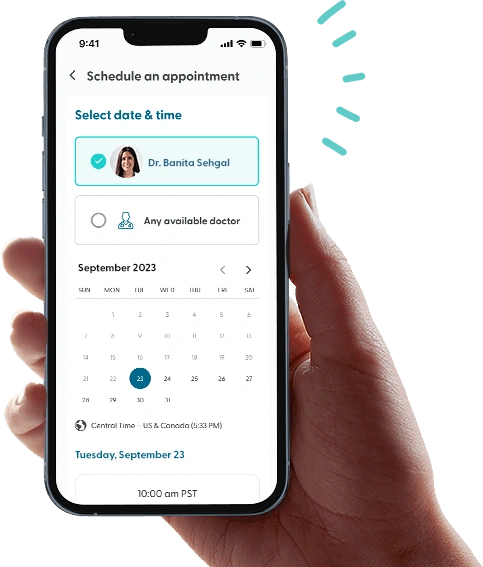Are Eggs Good for Weight Loss?
If you’re following a weight loss diet, it will likely feature eggs — and for good reason.
Eggs are one of the healthiest foods to add to your diet, offering a variety of essential nutrients without additional calories.
Understanding how to incorporate eggs into your diet and how this food can benefit your overall health is essential for making informed dietary choices.
In this article, we’ll look at everything you need to know about using eggs to help you slim down and achieve your weight loss goals.
Get prescription weight loss medication online.
Find out if you're eligible for GLP-1s, and get started on your weight loss journey for as low as $75/month.


The Connection Between Eggs and Weight Loss
Eating more eggs can aid weight loss by promoting satiety and reducing overall calorie intake.
Many studies have shown that eating eggs more regularly can help you feel fuller for longer and reduce your cravings.
This is mainly due to the fat and protein content in eggs that can enhance meal satisfaction.
Over time, this feeling of satiety helps reduce the amount of food you consume, lowering your caloric intake and helping you lose weight.
Nutritional Profile of Eggs
One large egg contains:
Calories: 70 kcal
Protein: 6,5 g
Fat: 4.8 g
Vitamin A: 160 mcg
Calcium: 56 mg
Vitamin D: 2 mcg
Riboflavin: .475 mg
Vitamin B12: .89 mcg
Folate: 47 mcg
Vitamin E: 1 mg
Niacin: .075 mg
Iron: 1,75 mg
How Exactly Can Eggs Help You Lose Weight?
High in protein
Eggs are rich in high-quality protein, which keeps you fuller for longer.
Consuming a high-protein diet can help curb your cravings for high-calorie snacks between meals, which can contribute to weight gain.
The body also uses more energy to metabolize proteins compared to digesting fats or carbohydrates.
Therefore, consuming high-protein foods can boost metabolism and help you burn more calories throughout the day.
Protein is also essential for preserving muscle mass during weight loss, ensuring that the body burns fat instead of muscle. This can help you look leaner and slimmer.
Nutrient-dense, low-calorie food
Eggs can provide a significant amount of essential amino acids, vitamins, and minerals without increasing your calorie intake.
One large egg — which is about 70 calories — contains vitamins A, B, D, and E that promote a healthy body and strong immune system.
It also contains calcium, niacin, and iron, which are vital for strong bones, brain health, clear skin, and overall muscle development.
Versatility
Adding eggs to your diet doesn’t necessarily mean plain or bland meals. Preparing eggs in different ways can enhance their flavor and inspire creative new recipes.
They also have a neutral flavor, meaning you can enjoy them with other foods.
For example, you can have scrambled eggs or baked eggs on toast without feeling like you’re eating the same thing twice.
This versatility helps to prevent food boredom, which is a common obstacle in long-term weight management.
Can promote blood sugar stability
Eggs are low in carbohydrates, a nutrient known for spiking blood sugar and causing cravings.
Because of their low carb content, eggs can help prevent these spikes and improve appetite control.
This can help you to reduce your caloric intake, which is essential for sustainable weight loss.
Improve metabolic health
The nutrients found in eggs — such as B vitamins and selenium — can support and improve metabolic health.
These nutrients can help you maintain an efficient metabolism and prevent diseases that affect the digestive system.
Ready to achieve your weight loss goals?
Shed pounds with GLP-1 medication prescribed online by licensed healthcare providers for as low as $75/month.


How to Incorporate Eggs into Your Diet
Use them in breakfast recipes
Breakfast is one of the most important meals of the day because it jumpstarts your metabolism and sets the tone for your daily food choices.
Eating eggs for breakfast is an excellent choice for a nutrient-dense, satisfying meal. Here are a few recipe ideas to try:
Classic options: Scrambled eggs, omelets, or sunny-side-up eggs are traditional breakfast dishes. These are quick to prepare and can be easily customized by adding vegetables — like spinach or mushrooms — or lean meats to increase their nutritional value.
Innovative breakfast ideas: Those who are more adventurous may want to consider baked avocado eggs, shakshuka, or a spinach and feta crustless quiche. These dishes can add variety to your breakfast routine and are packed with nutrients.
On-the-go options: For busy mornings, prepare a batch of hard-boiled eggs or ham, spinach, and egg muffin cups at the beginning of the week. These are perfect quick breakfasts or protein-rich snacks. Pair with whole-grain toast or a side of fruit for a balanced meal.
Vary your cooking methods
To prevent boredom and keep your meals interesting, consider trying different preparation methods for your eggs. These can include:
Boiled: Hard-boiled or soft-boiled eggs are excellent as part of a salad or as a standalone snack. Simply add uncracked eggs to a pot of boiling water for a few minutes before removing and peeling.
Poached: Poached eggs can be a delightful addition to toast or layered over steamed vegetables and whole grains for a hearty and nutritious meal. To poach an egg, add 3 cm of boiling water to a shallow pan. Then, crack an egg into a cup before gently tipping it into the pan and simmering for a few minutes. Remove the egg once it’s reached your desired consistency.
Baked: Baked eggs or frittatas can incorporate a variety of vegetables and cheeses, making a simple yet flavorful dish that can be enjoyed at any time of the day. For this preparation method, simply put your eggs in an ovenproof dish and bake at 400°F for 10 to 12 minutes.
Microwaved: For a quick and easy option, try scrambling eggs in a mug and microwaving them for a minute or two, adding cheese or diced vegetables as desired.
Add a source of fat and fiber
Combining eggs with healthy fats and fiber can help you create more balanced meals. Some popular options include:
Avocado
Olive oil
Nuts
Vegetables like spinach, kale, bell peppers, and mushrooms
Berries
Whole grains, like toast or legumes
Key Point: When is the Best Time to Eat Eggs?
Although eggs can be eaten at any time, some studies suggest they may be most effective for weight loss if you eat them in the morning.
Research shows that people who eat eggs for breakfast consume significantly fewer calories throughout the rest of the day.
This is compared to participants who had a carbohydrate-rich breakfast low in protein.
These participants generally required bigger lunches and experienced more cravings for sugary foods throughout the day.
What are the Potential Downsides of Eating More Eggs?
While eggs offer various health benefits and can be a valuable addition to a weight-loss diet, you should be aware of the potential downsides of consuming this food.
Cholesterol concerns
One of the most common concerns about eating eggs more regularly is their cholesterol content. A single large egg contains about 186 mg of cholesterol, which is found in the yolk.
Although the cholesterol content in eggs may seem minimal, consuming too many eggs can make it a more significant concern.
Increasing your cholesterol intake can negatively affect your health and put you at risk of developing conditions like diabetes and heart disease.
Impact on specific health conditions
Some research indicates that people with certain conditions should be careful when increasing their egg intake.
This includes individuals with diabetes, heart disease, and other cholesterol-related health conditions, as eggs are thought to worsen them.
However, since the cholesterol is contained in egg yolks, doctors generally recommend only eating the white parts for those living with the conditions mentioned above.
This allows you to reap the benefits of eating eggs without potentially harming your health.
When Should You Consult a Doctor About Weight Loss?
Although making dietary changes to promote weight loss doesn’t require a visit to the doctor, it’s important to be aware of related circumstances that do.
You should visit your doctor if you:
Have a significant amount of body fat or weight to lose
Have a body mass index (BMI) of 30 and above
Suffer from preexisting conditions, such as heart disease, diabetes, and high blood pressure
Are taking any chronic medications
Experience significant and unexplained weight loss
Have a history of eating disorders (EDs) or start to experience ED symptoms
Have extreme difficulties losing weight
Want to know more about weight loss surgeries
Consulting your doctor in these circumstances can help you get professional guidance and advice on how to lose weight safely while prioritizing your overall health.
Where Can You Learn More About Better Eating Habits and Maintaining a Healthy Weight?
If you’re looking for more information on creating healthy eating habits or want to learn about other ways to lose weight, LifeMD has got you covered.
We can connect you to a team of medical professionals who can help you learn more about taking control of your health — all from the comfort of your home.
With the LifeMD Weight Management Program, you’ll have access to innovative GLP-1 medications like Ozempic, Wegovy, and others, if you qualify.
The program approaches weight loss comprehensively, pairing medications with ongoing clinical support and care, lab testing, and information that will help you shed pounds.
LifeMD makes it easy to stay on top of your health because talking to a doctor, filling your prescriptions, getting your labs done—and more—are all easy and cost-effective. Come discover a healthcare solution built around you and your life.
More articles like this
Feel better with LifeMD.
Your doctor is online and ready to see you.
Join LifeMD today and experience amazing healthcare, discounted labs and prescription medications... plus around-the-clock access to medical guidance.

GLP-1
Ozempic® Wegovy® Zepbound®
This is it! Be part of the weight loss movement everyone’s talking about.
Get Started Now
 Medically reviewed and edited by
Medically reviewed and edited by 













